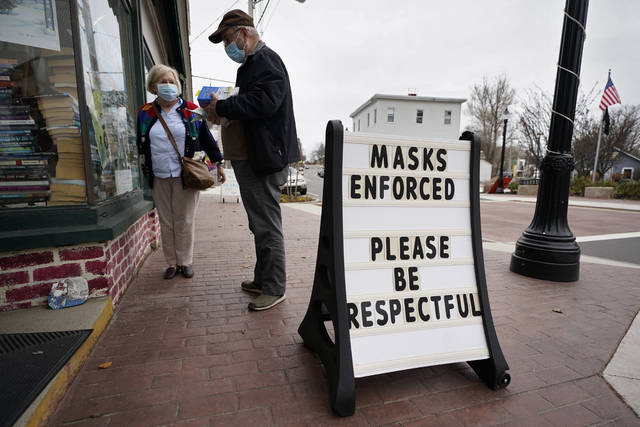
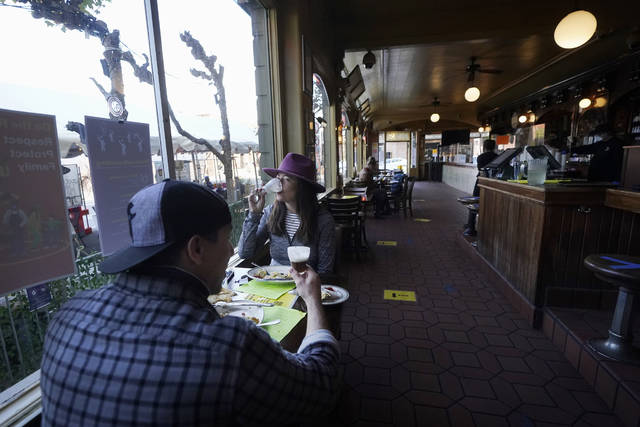
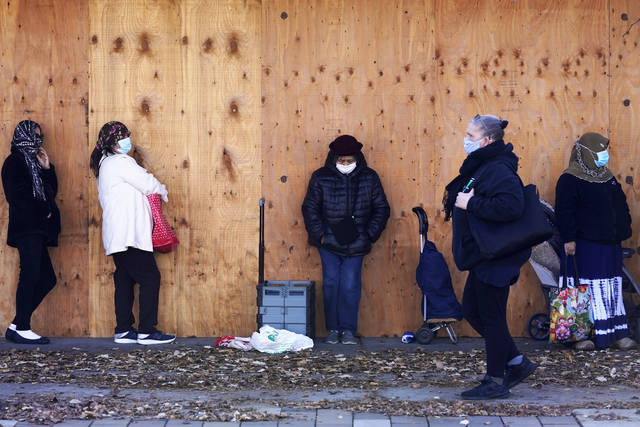
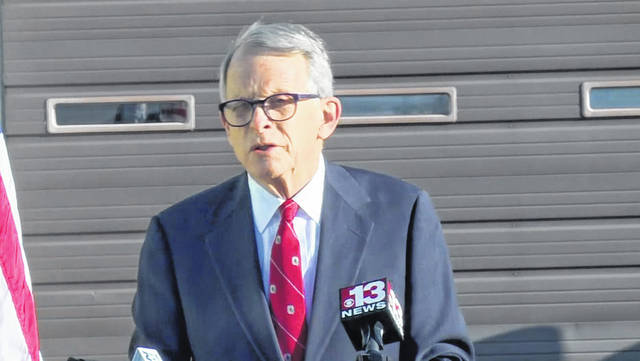
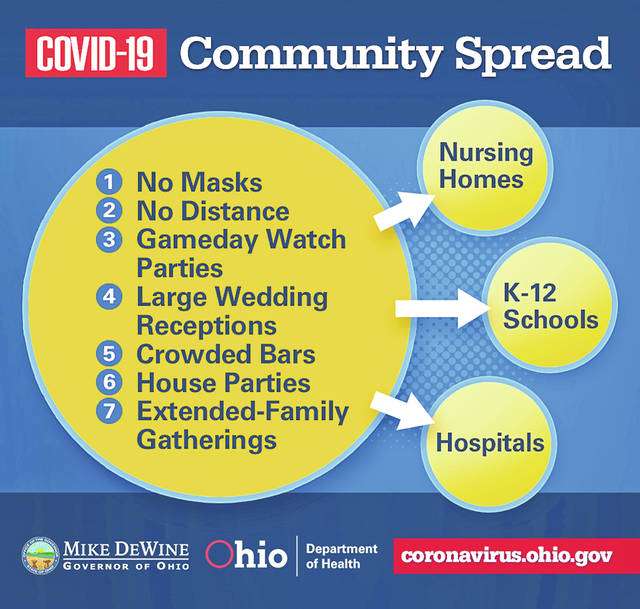
Gov. Mike DeWine told Ohioans Monday morning, “This is a critical time for us in Ohio. I can’t stress enough that we need to pull back. We don’t want to shut the state down because that has ramifications for things like mental health and drug addiction. Instead of shutting down, we need to slow down in our individual lives.”
Speaking especially to Southeast Ohioans from an airport in Huntington, W. Va., DeWine said, “To keep businesses open and to keep kids in school, we must slow this virus down. Unless you have a medical reason, everyone should be wearing a mask when they go into a retail business.
The Ohio Department of Health issued a revised health order to limit mass gatherings. To minimize the spread of COVID-19 through airborne particles passing between people in close contact, wedding receptions, funeral repasts, and other banquet events are subject to these restrictions.
“The order does not apply to religious observances; First Amendment protected speech, including petition/referendum circulators, and any activity by media; and governmental meetings which include meetings that must be open to public,” DeWine stated.
The order takes effect Tuesday, Nov. 17 at 12:01 a.m.
“I’m not going to tell anyone not to go to church, but if you do go, you certainly should wear a mask,” DeWine said. “There is an inherent danger of people getting together and gathering inside. We know that when people are speaking louder, there is more spread. People must be careful.
“We’ve had a mask order on since July, but with this much spread, it’s imperative that we protect the workers in grocery stores and retail outlets,” DeWine added. “It’s not fair to workers when someone comes into a store without a mask. It’s not fair to customers when employees are not masked.
You can read the full text of the order at bit.ly/2Uz7Ymm .
Vaccine ‘impressive’
The United States’ top infectious disease expert says news from Moderna that its COVID-19 vaccine candidate is 94.5% effective “is really quite impressive” the Associated Press reported Monday.
Dr. Anthony Fauci, head of the National Institute of Allergy and Infectious Diseases, told NBC’s “Today” on Monday that Moderna’s finding, along with similar results from Pfizer last week for its vaccine, “is something that foretells an impact on this outbreak.”
“So now we have two vaccines that are really quite effective, so I think this is a really strong step forward to where we want to be about getting control with this outbreak,” Fauci said.
Asked about the timeline for vaccinating people, Fauci projected that by the end of December, there will be doses available for people at high risk from the coronavirus.
Fauci said the Moderna and Pfizer vaccines have different platforms than other vaccines now in the pipeline. But he said the other vaccine platforms are using the “spike protein” of the coronavirus which has been researched very intensively, giving him hope that more than two of these vaccines will also be effective.
In Michigan and Ohio
Michigan Gov. Gretchen Whitmer says she has the authority to issue a second stay-at-home order to curb spiking coronavirus infections if necessary.
Whitmer also called “incredibly reckless” a comment by President Donald Trump’s science adviser Scott Atlas who urged people to “rise up” against Michigan’s latest restrictions. Atlas later tweeted that he “NEVER” would endorse or incite violence.
The Democratic governor spoke a day after announcing limits amid a surge of COVID-19 cases that has led to increased hospitalizations and deaths. She has urged the public to “double down” with precautions to avoid a shelter-in-place order like what was instituted in the spring.
Under the new restrictions that start Wednesday, Michigan high schools and colleges must halt in-person classes, restaurants must stop indoor dining and entertainment businesses must close for three weeks. Gathering sizes also will be tightened.
In Ohio, Bahram Akradi, founder, chairman and CEO of Life Time health clubs, objected when the governor added gyms to a list of businesses that could be shuttered if cases continue to rise.
“Another shutdown would just be completely devastating and simply unjust,” Akradi said. He added: “The damage of not allowing people to have healthy activity is much more than the gain.”
Jersey acts
New Jersey Gov. Phil Murphy says he will be reducing indoor and outdoor gathering limits because of the COVID-19 resurgence.
The Democrat told MSNBC on Monday that he will order indoor gatherings to fall from 25 to 10 and outdoor get-togethers from 500 to 150 people. The new indoor limit goes into effect Nov 17, while the outdoor level kicks in Nov. 23.
The lower levels come just before Thanksgiving and ahead of the winter holidays.
New Jersey’s coronavirus levels have been spiking, which Murphy has said amounts to a “second wave.”
The average increase over the first seven days of this month reached roughly 2,135, up from about 590 cases a day in early October. The average caseload increase for the first week of September was nearly 340 cases, according to state Health Department figures.
Oregon and New Mexico
The governors of Oregon and New Mexico ordered near-lockdowns Friday in the most aggressive response yet to the latest wave of coronavirus infections shattering records across the U.S., even as many of their counterparts in other states show little appetite for reimposing the hard-line restrictions of last spring.
“We are in a life-or-death situation, and if we don’t act right now, we cannot preserve the lives, we can’t keep saving lives, and we will absolutely crush our current health care system and infrastructure,” Democratic Gov. Michelle Lujan Grisham of New Mexico said in imposing a two-week stay-at-home order.
Oregon Gov. Kate Brown ordered a two-week “freeze” starting Wednesday, under which all businesses will be required to close their offices to the public and mandate work-from-home “to the greatest extent possible.”
While most Oregon stores will remain open, gyms, museums, pools, movie theaters and zoos will be forced to close, and restaurants and bars will be limited to takeout. Social gatherings will be restricted to six people.
The Democratic governor warned that violators could face fines or arrest.
“For the last eight months, I have been asking Oregonians to follow to the letter and the spirit of the law, and we have not chosen to engage law enforcement,” Brown said. “At this point in time, unfortunately, we have no other option.”
Both states had lockdowns earlier in the year, but the coronavirus is coming back with a vengeance across the country, and the U.S. is facing a long, dark winter. The scourge is blamed for 10.7 million confirmed infections and almost a quarter-million deaths in the U.S., with the closely watched University of Washington model projecting nearly 439,000 dead by March 1.
Across U.S.
Deaths have climbed to about 1,000 a day on average. New cases per day are soaring, reaching another all-time high on Thursday of more than 153,000. Hospitals are getting swamped.
Still, there is little will among many governors and other elected officials for going back to the kind of lockdowns and large-scale business closings seen last spring. Some governors also continue to resist issuing statewide mask rules.
Among the reasons given: public fatigue, fear of doing more damage to already-crippled businesses, lack of support from Washington, and the way efforts to tame the virus have become fiercely politicized.
Officials have gotten pushback from some constituents, especially business owners who fear for their livelihoods.
“I think that governors and mayors are, again, in a really tough spot. The American population is emotionally and economically exhausted,” Dr. Megan Ranney, an emergency physician and professor at Brown University in Providence, Rhode Island.
President Donald Trump asked all Americans to remain “vigilant” but ruled out a nationwide “lockdown.”
“Hopefully, whatever happens in the future, who knows which administration it will be, I guess time will tell, but I can tell you this administration will not go to a lockdown,” Trump said in his first public remarks since his defeat by President-elect Joe Biden.



